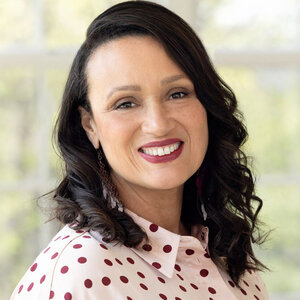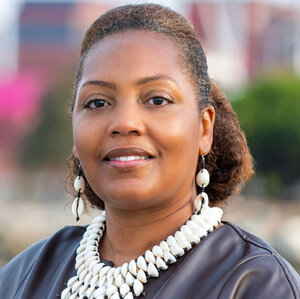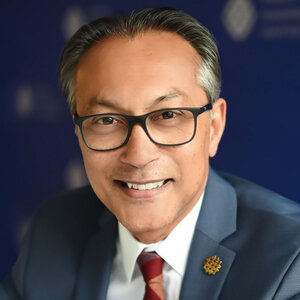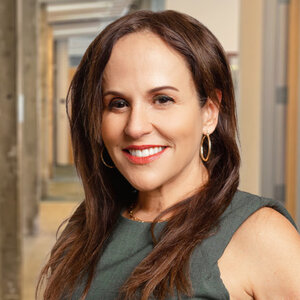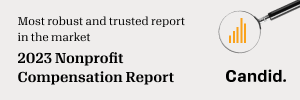Tiffany Benjamin, CEO, Humana Foundation: Centering equity in forming strong partnerships
December 12, 2023
In 2022, Tiffany Benjamin assumed the role of CEO at the Humana Foundation in Louisville, Kentucky. She leads the foundation in establishing new ways to co-create healthy communities, sustain advances in health outcomes, and eliminate unjust differences in health and health care.
Benjamin brings a robust understanding of social determinants of health and a commitment to bridging systemic gaps in education, employment, wealth, social connectedness, and food security. Formerly president and senior director of social impact of the Lilly Foundation, Benjamin also held various legal roles at Lilly, including senior director of litigation and legal compliance and assistant general counsel. Prior to joining Lilly, she served as senior investigative counsel for the United States House of Representatives Energy and Commerce Committee. In addition, Benjamin serves as board chair for the Center for Disaster Philanthropy.
PND asked Benjamin about the impact of environmental threats to communities of color, the Humana Foundation’s approach to and broader outlook for disaster relief funding, and the ways in which it’s contributing to advancing health equity.
Philanthropy News Digest: Given the interconnectedness of social justice activism with the pursuit of environmental justice, what should be the philanthropic approach to funding environmental causes and addressing climate change?
Tiffany Benjamin: When we think about the impacts of natural disasters, what we’re really talking about is infrastructure. When you look at areas with the most unpredictable climates, or where levies and substandard housing are most likely to be damaged, or where exposure to environmental hazards will cause further harm, it’s most likely where communities of color exist. Funders can approach this work from many different lenses, but ultimately, what you should be thinking about is how your work is centered on equity and that you’re helping communities of color who will be the most impacted in a disaster or crisis because of their vulnerable infrastructure and their lack of resourcing for resiliency.
There’s no question that climate change is rapidly escalating, and we’re seeing those effects. Storms, drought, floods, and fires are happening more frequently and with more intensity, and underserved communities bear the brunt of these crises. Funders can address these issues by investing in climate mitigation or community resiliency. All of it is important work. However, whatever philanthropy decides to invest in, the focus should be on longer-term community sustainability and resiliency and ensuring that environmental justice is central to that work.
PND: Considering the disproportionate vulnerability of Latinos, African Americans, Asian Americans, and Native Americans to health and environmental threats compared to their white counterparts, how should grassroots communities develop action plans to secure funding?
TB: The first step I would recommend is that community leaders cultivate relationships with local organizations in advance of when a disaster occurs. Often, people wait until a crisis happens and then seek funds from those groups. If you’re disconnected and lack those important community relationships, it will be more challenging to secure that funding. The second important thing is to have a disaster plan in place for how you can support your community in the event of a disaster, including how you will utilize those funds, funnel resources to those most affected, and what you will prioritize. If you develop connections with the organizations through which the money often flows in a disaster situation early—and have a plan in place—it’s much easier to garner that help quickly and utilize it appropriately when it’s needed.
PND: How does the Humana Foundation approach funding for hurricane, wildfire, earthquake, flood, or other disaster relief and recovery efforts in the face of ongoing climate change concerns?
TB: The Humana Foundation is committed to addressing inequities in all of our work, including disasters. This means we fund organizations focused on recovery efforts that ensure our dollars get to people in the community with the greatest needs and who have been most adversely affected by the disaster. Our aim is to build stronger, more resilient communities rather than building back what existed prior to the disaster since the areas most impacted often suffer from years of neglect, lack of investment in infrastructure, and exposure to environmental hazards that make them extremely vulnerable when storms, floods, or fires occur.
We believe the only way to make a real difference in the lives of those affected is by forming strong partnerships with people and organizations on the ground, listening and responding to what the community says are its critical needs, and then staying committed for the long term.
We believe the only way to make a real difference in the lives of those affected is by forming strong partnerships with people and organizations on the ground, listening and responding to what the community says are its critical needs, and then staying committed for the long term. While donations usually pour in during the immediate aftermath of a disaster, they quickly dissipate. Long-term recovery is where philanthropic funds can have the most impact.
In December 2021, the foundation granted $500,000 in response to the tornado that hit western Kentucky, with a devastating impact on Mayfield and Dawson Springs. Months after the tornado’s devastation, we invested in long-term recovery by supporting the Black woman-led organization Mayfield Minority Enrichment Center. The organization utilized our grant as part of its mission to empower local youth and ensure long-term recovery for minority communities impacted by the tornado.
With the foundation’s focus on health inequities, we believe the only way to create healthier communities is through a 360-degree approach. We not only need to build a sufficient medical infrastructure, but also ensure that people have access to affordable healthy food, housing, educational and work opportunities, and reliable transportation. Especially important in the wake of a disaster is providing mental health services and programs that increase social connectedness, which is often severed when people are displaced from their homes.
These are huge undertakings that are beyond an individual foundation’s capacity. It’s essential to work closely with other funders to pool resources and coordinate efforts. We also continually consider how we can work with government entities, educational institutions, and businesses to address these long-standing structural disparities.
PND: How is the Humana Foundation actively contributing to the advancement of health equity amid challenges such as food insecurity and mental health disparities among diverse populations, including seniors, school-aged children, and veterans?
TB: In addition to our disaster recovery investments, the Humana Foundation is working to advance health equity through programmatic grantmaking, solution-based advocacy, and research that addresses disparities in access to healthy foods and mental health services, which are substantial contributors to multiple health risks among underserved populations. Our efforts to reduce food insecurity include community-based collaborations that have served several million at-risk individuals since 2020 with funding that has enabled the purchase of affordable fresh foods in food deserts and provided nutrition and food benefit education for those communities.
Our work is also centered on addressing the mental health needs of people living in underserved and marginalized communities, who have higher rates of poor mental health and suicide. We do that by partnering with local communities and organizations to eliminate mental health disparities, create support networks, and connect people with programs and services committed to suicide prevention, substance disorder treatment, and combating loneliness and isolation.
We’re all aware of the mental health crisis impacting our nation’s children. There are tremendous unmet needs and inequities in access to mental health care for children from low-income and marginalized communities. One way we are working to address these disparities is through our grantmaking and partnership with National CARES Mentoring, which provides Black adult mentors for underserved Black children, focusing on their emotional, social, and academic development. Additionally, one of our major initiatives this year has been supporting the USAA Foundation’s Face the Fight mission to reduce veteran suicides by funding evidence-based suicide prevention programs for vulnerable veteran populations, including women and veterans of color.
And, tying it back to disaster recovery, there are significant trauma-related mental health effects of disasters, particularly for already vulnerable populations that are often displaced from their communities and have few resources to rebuild their lives. In response to hurricanes Ian and Fiona, the Humana Foundation established a crisis intervention hotline with free counseling for anyone needing help and support to cope with the consequences of those storms.
There are significant trauma-related mental health effects of disasters, particularly for already vulnerable populations that are often displaced from their communities and have few resources to rebuild their lives.
PND: Recently, the Humana Foundation initiated a health equity research plan across its communities, acknowledging the importance of public data for community needs. Can you provide an update on the progress of this initiative and share any preliminary results?
TB: This year, we piloted a number of studies on health equity issues, and in 2024, we’ll be expanding that work by awarding more research grants to academic institutions. As part of that initiative, we just announced several social determinants of health research grants to various institutions, including the University of Texas Health Science Center at Houston’s School of Public Health, the University of North Carolina at Chapel Hill’s Gillings School of Global Public Health and School of Social Work, and the Yale School of Medicine that will examine barriers to healthy emotional connections and approaches to nutrition, and explore the relationship between these issues and chronic disease and mental health.
While the foundation is dedicated to community work, we also need research to prove that work is successful and sustainable. For instance, one of these research projects will look at how we combat loneliness in youth through mentorship programs and test whether doing so is an effective way to support their mental health and well-being.
Additionally, in 2023, we added a chief impact officer (CIO) to our staff. All of the grants we awarded this past year have an impact component, so it’s important that we share information on the success of those initiatives. That aspect of our grantmaking will become even more prominent going forward. One example of the influence of a CIO on our approach can be seen in our recent funding of four separate grants to look at different meal delivery programs and their effect on nutrition outcomes. These findings will eventually be published and shared with our grantees. Also, in 2024, we will use various standardized metrics for our grants, including the UCLA loneliness index and other metrics around social determinants of health and outcomes, to examine what is having the greatest impact.
PND: In 2020, the Humana Foundation pledged $50 million in disaster relief to aid both immediate and long-term COVID-19 relief and recovery efforts. What notable impacts have resulted from this commitment, and how have communities experienced the benefits of philanthropy during and in the aftermath of the pandemic in recent years?
TB: The pandemic clearly exposed the health and access inequities the Humana Foundation has been working to overcome. One of our focus populations is underserved seniors, who were among the most vulnerable groups impacted by COVID-19. With limited access to the internet and digital skills, they were put at even greater physical and mental health risk as the world turned online for medical appointments and basic living needs, as well as social connections.
Early in the pandemic, we awarded a $3 million grant to the nonprofit Older Adults Technology Services (OATS) from AARP, with the initial goal of connecting one million seniors, particularly those in marginalized communities, to the internet. Additionally, the funding supported a comprehensive research report presenting a detailed portrait of digitally disconnected older adults. Those initiatives helped influence the federal government’s launch of the Affordable Connectivity Program, which provided discounted internet service to low-income Americans. OATS then used its Humana funding to raise awareness of the government program and provide digital literacy training for seniors through its Senior Planet services, ultimately issuing the report Fly Like an Eagle: Measuring Transformational Social Outcomes Among Seniors Using Technology, showing online digital training can significantly decrease feelings of social isolation and loneliness in older adults. The foundation recently provided additional funding to OATS to further expand its Senior Planet digital training programs.
We also gave a substantial grant to our long-standing partner, Volunteers of America (VOA), for COVID-19 relief programs. One of the programs our funding supported was expanding the VOA’s Family Focused Recovery centers, which are substance disorder treatment facilities that enable children to stay with their moms during their recovery. It’s a very powerful approach that incentivizes women to get sober and also doesn’t cause the traumatic effects that breaking families apart can have on both child and mother. Last year, we funded that program again and awarded an additional grant to VOA for developing best practices on integrating technology into senior housing, which also had its start during COVID-19.
These are just a few examples of how pandemic-initiated grants have led to expanded partnerships with those organizations to further the successes of these efforts into the post-pandemic era.
If you’re seeking to make a measurable impact in support of people and communities, we need to actively listen to those we want to serve and approach them with respectful inquiry and empathy.
PND: As CEO of the Humana Foundation, how do you approach leading community-driven rebuilding efforts within philanthropy to address the inequities that render residents more susceptible to the impacts of extreme weather events? How are you working toward fostering stronger and more resilient communities?
TB: As a leader and CEO of the Humana Foundation, the most important thing I can do is to listen first and then respond to the needs of the community, as opposed to deciding what I think those needs might be. If you’re seeking to make a measurable impact in support of people and communities, we need to actively listen to those we want to serve and approach them with respectful inquiry and empathy. It’s important to develop solutions where everybody’s voice counts, and our voice isn’t louder than others’. In fact, our voice should be the softest because we want to learn what the community’s most important health need is. We then supply resources to support those efforts while they lead the way.
One of the outgrowths of this approach is the Humana Foundation Senior Council, an advisory group made up of 65+ year-old members and high school seniors from across the geographies we serve. They are leaders in their communities who are committed to advancing health equity and are an important addition to our boots on the ground in those communities.
I am also a firm believer in investing in evidence-based solutions. As mentioned earlier, we support research and aggregate data around the best way to respond and support communities impacted by a disaster. More generally, we are testing and developing solutions for addressing systemic and structural health inequities in partnership with the University of Louisville to create evidence-based, scalable, and financially sustainable solutions to improve health outcomes and quality of life for vulnerable and marginalized populations.
It really does take a village. I believe strongly in partnering closely with local organizations and our grantees to create a collective system where we come together to share learnings and solutions, where we identify what can be made scalable, what needs greater state or national support, and how we can help facilitate those connections.
As a funder, one of my pivotal roles is to support organizations that help residents navigate through the bureaucratic hoops to obtain government assistance. Many of the organizations we fund deploy long-term recovery case workers to assist families and individuals in obtaining available local and federal resources. Our aim is also to help raise the voices and visibility of the community by funding grassroots organizing efforts to advocate for systemic changes that address inequities and build stronger and more resilient communities.
Lauren Brathwaite is content editor at Philanthropy News Digest.


